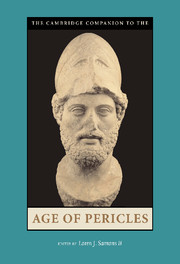Book contents
- Frontmatter
- Introduction: Athenian History and Society in the Age of Pericles
- 1 Democracy and Empire
- 2 Athenian Religion in the Age of Pericles
- 3 The Athenian Economy
- 4 Warfare in Athenian Society
- 5 Art and Architecture
- 6 Other Sorts: Slaves, Foreigners, and Women in Periclean Athens
- 7 Drama and Democracy
- 8 The Bureaucracy of Democracy and Empire
- 9 Plato’s Sophists, Intellectual History after 450, and Sokrates
- 10 Democratic Theory and Practice
- 11 Athens and Sparta and the Coming of the Peloponnesian War
- Conclusion: Pericles and Athens
- Bibliography
- Index
9 - Plato’s Sophists, Intellectual History after 450, and Sokrates
Published online by Cambridge University Press: 28 March 2009
- Frontmatter
- Introduction: Athenian History and Society in the Age of Pericles
- 1 Democracy and Empire
- 2 Athenian Religion in the Age of Pericles
- 3 The Athenian Economy
- 4 Warfare in Athenian Society
- 5 Art and Architecture
- 6 Other Sorts: Slaves, Foreigners, and Women in Periclean Athens
- 7 Drama and Democracy
- 8 The Bureaucracy of Democracy and Empire
- 9 Plato’s Sophists, Intellectual History after 450, and Sokrates
- 10 Democratic Theory and Practice
- 11 Athens and Sparta and the Coming of the Peloponnesian War
- Conclusion: Pericles and Athens
- Bibliography
- Index
Summary
Plato’s Sophists
A series of figures whom Plato called “the sophists” were among the most prominent intellectuals working in Athens during the second half of the fifth century. By a traditional consensus based largely on his testimony, the sophists were traveling wisdom professors for hire, especially in the art of rhetoric. Plato's principal sophists include Protagoras of Abdera, Gorgias of Leontini, Prodikos of Keos, Hippias of Elis, and Thrasymachos of Chalcedon. Less prominent sophists include the Athenians Antiphon, Kallikles, Kritias, the Chian brothers Euthydemos and Dionysodoros, and Polos of Akragas. Most of these figures are featured in Plato's dialogues, and some seven dialogues bear sophists' names. The sophists were among Plato's constant preoccupations, for reasons we shall see.
Plato and his followers sharply distinguish the sophists from the philosophers who worked before and after them. “Never before had such teachers been seen, never such teaching.” “Philosophers” - our sense of this term is also Platonic - investigated metaphysical, political, and ethical questions in search of the truth. “Sophists” taught expository and argumentative techniques to those who sought success in public life (Pl. Prt. 316b, 319a). Rhetoric “brings freedom to men and to each man dominion over others,” Plato's Gorgias proclaims. “Possessed of such power you will make the doctor and the trainer your slaves; your businessman will prove to be making money not for himself but for another, for you who can speak and persuade multitudes” (Gorg. 452d–e).
- Type
- Chapter
- Information
- The Cambridge Companion to the Age of Pericles , pp. 215 - 237Publisher: Cambridge University PressPrint publication year: 2007
- 3
- Cited by



